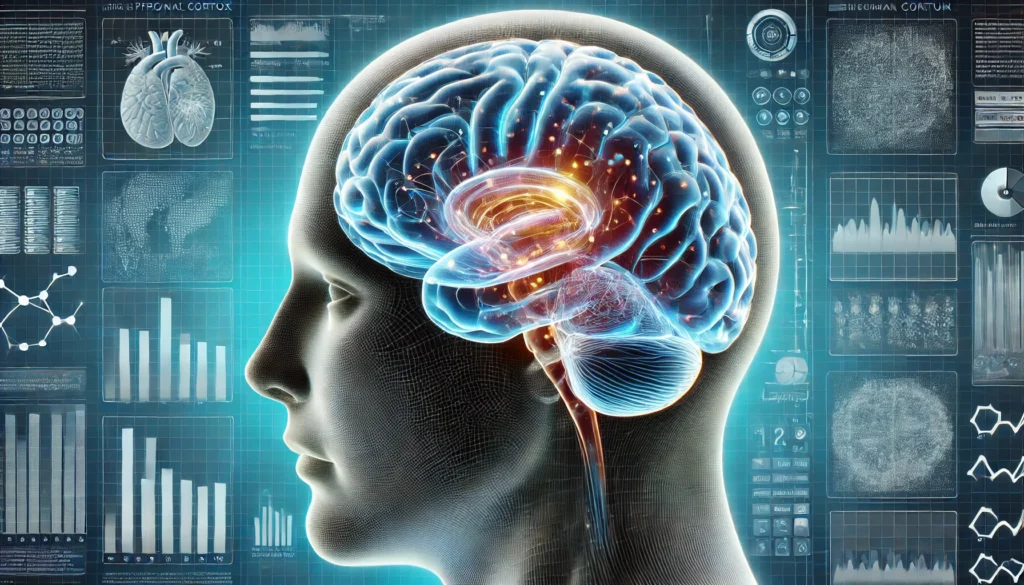Introduction
The human brain is arguably the most complex organ in the body, responsible for managing everything from basic survival instincts to higher-order thinking and emotional regulation. Within this intricate network lies a concept that defines how well we process information, react to our environment, and perform mental tasks—known as cognitive brain functioning. In recent years, there has been a surge of interest in understanding how the brain influences cognitive performance, especially as modern life places increasing demands on our mental capabilities. Whether we’re navigating work deadlines, juggling personal responsibilities, or simply trying to maintain mental clarity throughout the day, optimal brain functioning is critical.
You may also like: How to Stop Cognitive Decline: Science-Backed Steps for Prevention and Brain Longevity
What makes some people excel in focus, memory retention, and adaptability while others struggle with forgetfulness, distraction, or mental fatigue? The answer lies in the science of cognitive functioning and its interplay with biological, environmental, and psychological factors. By exploring this dynamic field, researchers and healthcare professionals aim to uncover the roots of mental sharpness and design interventions that help preserve or enhance it across the lifespan. In this article, we’ll take a deep dive into the mechanisms of the cognitive brain, decode how it affects everyday functioning, and discuss what science currently says about achieving and maintaining peak cognitive performance.

Understanding the Cognitive Brain: The Science of Mental Processing
Cognitive brain processes refer to the mental activities involved in acquiring knowledge and understanding through thought, experience, and the senses. This includes processes such as attention, memory, language, problem-solving, and decision-making. Unlike automatic bodily functions like heartbeat or digestion, these mental faculties require deliberate effort and are influenced by a wide range of variables. The cerebral cortex, particularly the prefrontal cortex, plays a central role in cognitive functioning. This area is responsible for executive functions, including reasoning, planning, and impulse control.
The hippocampus is another essential brain structure when discussing cognitive performance. Located within the temporal lobe, it is the brain’s primary center for memory formation and consolidation. Meanwhile, the amygdala plays a key role in emotional memory and reactions, which can either enhance or impair cognitive clarity depending on the context. The neural networks that connect these areas create the framework for how the cognitive brain operates in real-world scenarios, such as learning a new skill or remembering a person’s name.
Understanding these anatomical and physiological underpinnings is essential for grasping the broader cognitive medical definition. In medical terms, cognitive functioning refers to the capacity of the brain to perform its duties of thinking, understanding, learning, and remembering. It is measured through various assessments that evaluate intellectual functioning, memory recall, verbal fluency, and problem-solving ability. A disruption in any of these domains—whether due to injury, disease, or stress—can lead to measurable declines in cognitive performance.
Key Components of Cognitive Functioning and Their Role in Daily Life
Cognitive functioning encompasses several interrelated domains, each of which plays a specific role in helping individuals interact effectively with their environment. Attention, for instance, allows the brain to filter out irrelevant stimuli and focus on what matters most in a given moment. This selective focus is vital in a world overflowing with information and distractions. Short-term memory enables individuals to hold small amounts of information in their mind for immediate use—like remembering a phone number long enough to dial it. Long-term memory, on the other hand, stores vast quantities of information over time, helping us retain knowledge and experiences.
Another vital aspect of cognitive brain activity is processing speed. This refers to how quickly an individual can perceive information, make sense of it, and formulate a response. Faster processing speed often correlates with higher cognitive performance, particularly in fast-paced or complex environments. Language ability is also crucial, as it allows us to communicate ideas, understand others, and engage with the world meaningfully. Together, these cognitive functions enable humans to perform a wide range of tasks, from simple daily routines to complex problem-solving endeavors.
The integration of these components is what ultimately allows for coherent, goal-directed behavior. When one of these functions becomes impaired—such as during sleep deprivation or neurological illness—the impact on day-to-day functioning can be profound. This interconnectedness emphasizes the importance of a healthy cognitive brain and explains why interventions to enhance or maintain cognitive performance are gaining increasing scientific interest.

The Biological Foundations of Cognitive Performance
Cognitive performance doesn’t exist in a vacuum. It is deeply rooted in the biology of the brain and the physiological processes that sustain it. At the cellular level, neurons communicate through synapses using electrical impulses and neurotransmitters. These chemical messengers—including dopamine, serotonin, and acetylcholine—play pivotal roles in mood regulation, motivation, memory, and attention. When neurotransmitter levels are balanced, cognitive functioning tends to be stable and efficient. When these systems are disrupted, however, issues like brain fog, distractibility, or even cognitive decline can occur.
Brain-derived neurotrophic factor (BDNF) is another biological component tied to cognitive brain health. This protein promotes the growth and survival of neurons and supports neuroplasticity—the brain’s ability to adapt and reorganize in response to experience or injury. Higher levels of BDNF have been linked to improved learning and memory, making it a key target in cognitive research. Genetic predispositions also play a role, with certain genes influencing traits like attention span or susceptibility to cognitive disorders.
On a systemic level, factors like blood flow, oxygenation, and glucose metabolism directly impact brain function. The brain is an energy-intensive organ, consuming about 20% of the body’s total energy despite comprising only 2% of its mass. A consistent supply of nutrients and oxygen is essential for maintaining high levels of cognitive performance. Any interruptions—such as those caused by cardiovascular problems or metabolic disorders—can quickly lead to cognitive challenges.
Lifestyle Factors That Influence Cognitive Brain Health
While biology lays the foundation for cognitive functioning, lifestyle habits are the bricks and mortar that either support or erode that foundation over time. One of the most significant lifestyle factors is sleep. Research shows that sleep is essential for memory consolidation, emotional regulation, and cognitive restoration. Lack of sleep not only impairs short-term memory and attention but also increases the risk of long-term cognitive decline. Deep sleep stages are especially important, as they allow the brain to clear out metabolic waste through the glymphatic system, a process likened to a nightly cleansing of the cognitive brain.
Nutrition is another pillar of cognitive health. Diets rich in omega-3 fatty acids, antioxidants, and vitamins such as B12 and D have been shown to support cognitive functioning. The Mediterranean diet, which emphasizes whole foods like fish, olive oil, nuts, and vegetables, is particularly lauded for its brain-boosting effects. Conversely, high intake of sugar and processed foods has been linked to inflammation and impaired cognitive performance.
Physical activity is also crucial. Aerobic exercise increases blood flow to the brain, boosts BDNF levels, and enhances executive functioning. Regular physical movement not only supports general health but also directly impacts cognitive clarity and mood stability. Mental stimulation, such as learning a new language, solving puzzles, or engaging in complex problem-solving, also strengthens neural connections and supports long-term cognitive health.
Stress management is equally important. Chronic stress can flood the brain with cortisol, a hormone that, in high levels, is toxic to neurons and can shrink areas of the brain associated with memory. Mindfulness practices, social connection, and emotional resilience are all protective factors that buffer against the negative effects of stress on cognitive performance.

Cognitive Decline: Early Signs and Risk Factors
Cognitive decline can be subtle at first—misplacing items, struggling to find words, or feeling mentally foggy—but over time, these small lapses can evolve into more significant impairments. It’s important to distinguish between normal age-related changes and pathological cognitive decline. While it’s common for older adults to experience a slowdown in processing speed or minor memory lapses, significant declines in executive functioning, language, or spatial reasoning may indicate underlying issues such as mild cognitive impairment (MCI) or dementia.
Several risk factors contribute to the development of cognitive decline. Aging is the most significant non-modifiable factor, but others include genetic predisposition (such as carrying the APOE4 allele), cardiovascular disease, diabetes, smoking, and chronic inflammation. Lifestyle habits like poor diet, sedentary behavior, and sleep deprivation further exacerbate these risks. Understanding these contributing factors allows for early intervention and, in some cases, prevention or slowing of cognitive deterioration.
It’s also essential to acknowledge the role of mental health in cognitive functioning. Depression, anxiety, and other mood disorders can negatively affect attention, memory, and decision-making. These conditions often create a vicious cycle: poor mental health impairs cognition, and impaired cognition worsens mental health. Addressing both simultaneously is vital for restoring overall cognitive brain function.
How to Improve and Preserve Cognitive Performance Across the Lifespan
The good news is that cognitive functioning is not a fixed trait—it can be cultivated, improved, and preserved through a series of proactive choices. Neuroplasticity, the brain’s inherent ability to adapt, makes it possible to strengthen cognitive performance through consistent effort. Engaging in lifelong learning is one of the most effective ways to support cognitive vitality. Whether it’s picking up a new hobby, learning to play an instrument, or pursuing formal education, mental stimulation keeps the brain agile.
Mind-body practices such as yoga, meditation, and tai chi have also shown promise in enhancing cognitive clarity. These activities not only promote relaxation but also improve brain structure and function by reducing stress, enhancing blood flow, and increasing gray matter density in areas related to attention and emotional regulation.
Dietary supplementation may also support cognitive performance, though this should be approached with care and under professional guidance. Nootropic compounds, including omega-3s, phosphatidylserine, and certain adaptogens, have been studied for their potential to enhance memory, focus, and mental stamina. However, these should not replace healthy lifestyle practices, which are the true cornerstone of long-term cognitive health.
Regular health check-ups, including screenings for hypertension, diabetes, and sleep disorders, can catch early signs of systemic issues that might affect brain function. Managing these conditions effectively reduces the risk of cognitive impairment and promotes optimal performance at any age.

The Future of Cognitive Brain Research and Personalized Interventions
As neuroscience continues to evolve, the future of cognitive brain research looks increasingly personalized and precise. Advances in brain imaging, genomics, and wearable neurotechnology are opening new doors for understanding how individual brains function and how they respond to various stimuli. Personalized brain training programs, digital therapeutics, and AI-driven cognitive assessments are currently being developed to target specific areas of weakness in cognitive functioning.
Pharmacological research is also exploring compounds that enhance neurotransmission, increase neuroplasticity, or reduce neuroinflammation. While no medication can yet promise sustained improvements in cognitive performance for healthy individuals, treatments for cognitive impairment and neurodegenerative diseases are improving steadily. Combining medical interventions with lifestyle modifications may offer a synergistic path toward maintaining mental clarity and agility throughout life.
Furthermore, the integration of behavioral data with biological markers allows for early detection of cognitive decline, even before symptoms become apparent. This shift toward preventive neurology underscores the importance of monitoring cognitive performance as a vital sign—just like blood pressure or cholesterol.
Frequently Asked Questions
1. What is the cognitive medical definition and how does it apply to brain health?
The cognitive medical definition refers to the brain’s ability to perform intellectual tasks, including memory, attention, language, problem-solving, and reasoning. It serves as a foundational framework for evaluating mental health and neurological functioning. This definition is used by clinicians to assess whether cognitive changes are within the range of normal aging or indicative of a medical condition. Understanding this definition helps clarify when interventions are needed and what areas of cognitive functioning may be targeted for support or therapy.
2. How does cognitive brain health impact emotional well-being?
Cognitive brain health plays a central role in emotional regulation, decision-making, and stress resilience. When cognitive functioning is optimal, individuals can process emotions more effectively, maintain perspective during stressful events, and adapt to challenges. Conversely, impairments in cognitive performance can lead to poor emotional control, increased anxiety, and even depression. A well-functioning cognitive brain creates a stable foundation for emotional balance and psychological flexibility.
3. Can poor sleep affect cognitive performance?
Yes, poor sleep is one of the most significant factors negatively affecting cognitive performance. Sleep is crucial for consolidating memory, clearing metabolic waste from the brain, and maintaining attention and focus during the day. Sleep deprivation impairs nearly every aspect of cognitive functioning, including reaction time, decision-making, and memory recall. Chronic sleep issues may even increase the risk of cognitive decline and neurodegenerative diseases over time.
4. What role does physical exercise play in cognitive functioning?
Physical exercise is essential for maintaining cognitive brain health. It enhances blood flow to the brain, increases neurotrophic factors like BDNF, and supports neurogenesis—the formation of new brain cells. Regular exercise has been associated with improved executive functioning, better memory, and slower cognitive decline in aging populations. It also helps reduce risk factors such as high blood pressure and insulin resistance, which can compromise brain health.
5. Are cognitive challenges reversible or preventable?
In many cases, cognitive challenges can be reversed or significantly mitigated through targeted interventions. Lifestyle changes—such as improving diet, increasing physical activity, getting adequate sleep, and reducing stress—can enhance cognitive performance. Early detection of issues and timely medical treatment for conditions like sleep apnea or vitamin deficiencies also contribute to cognitive recovery. The brain’s plasticity allows it to adapt when given the right tools and environment.
6. How can nutrition influence the cognitive brain?
Nutrition is a cornerstone of cognitive brain functioning. Essential nutrients such as omega-3 fatty acids, B vitamins, magnesium, and antioxidants help protect brain cells and support neurotransmitter activity. Diets rich in whole foods, especially the Mediterranean diet, have been shown to reduce inflammation, support mental clarity, and lower the risk of cognitive decline. Conversely, diets high in processed sugars and trans fats may impair cognitive performance over time.
7. Is there a difference between cognitive functioning and intelligence?
Yes, while related, cognitive functioning and intelligence are distinct concepts. Intelligence refers to the ability to learn, understand, and apply knowledge, often measured through IQ tests. Cognitive functioning encompasses a broader set of mental processes, including memory, attention, language, and problem-solving. Someone may have average intelligence but superior cognitive performance in specific areas such as memory or verbal fluency. Understanding this distinction helps tailor cognitive interventions more precisely.
8. How does chronic stress affect cognitive performance?
Chronic stress has a profound impact on the cognitive brain. Elevated cortisol levels can damage neurons, reduce hippocampal volume, and impair the functioning of the prefrontal cortex. These changes affect memory, attention, and decision-making. Over time, stress can erode cognitive resilience and increase the risk of mental health disorders. Effective stress management techniques—such as mindfulness, breathing exercises, and social support—are essential for protecting cognitive functioning.
9. What are early warning signs of cognitive decline?
Early warning signs of cognitive decline include frequent memory lapses, difficulty concentrating, trouble finding words, and reduced problem-solving abilities. Other indicators may include changes in mood or behavior, confusion in familiar environments, and decreased motivation. Recognizing these symptoms early allows for timely intervention, which may slow progression and improve quality of life.
10. Can digital tools and brain training apps improve cognitive performance?
Digital tools and brain training apps can be beneficial when used consistently and as part of a holistic approach. These tools often target specific areas of cognitive functioning such as working memory, attention, or processing speed. While not a substitute for healthy lifestyle habits, they can provide measurable improvements, especially in populations at risk for cognitive decline. Scientific validation and individualized use enhance their effectiveness.

Conclusion
Cognitive brain functioning is not merely a passive background process—it is the active, dynamic force that shapes how we think, remember, focus, and navigate the world. From the neural circuitry of the hippocampus to the executive oversight of the prefrontal cortex, cognitive performance is an intricate dance of biology, experience, and environment. As science continues to unravel the complexities of the cognitive medical definition, it becomes increasingly clear that cognitive health is both a reflection and a driver of overall well-being.
By understanding the multiple factors that influence cognitive functioning—ranging from sleep and diet to stress and genetics—we empower ourselves to take actionable steps toward preserving mental clarity and enhancing brain resilience. Whether you’re a student aiming to boost focus, a professional managing mental fatigue, or an older adult concerned with cognitive longevity, the path to optimal brain health is grounded in evidence-based strategies and lifelong commitment.
Ultimately, nurturing the cognitive brain isn’t just about avoiding decline—it’s about unlocking the full potential of our minds and living with sharper memory, deeper focus, and greater clarity each day.
Was this article helpful? Don’t let it stop with you. Share it right now with someone who needs to see it—whether it’s a friend, a colleague, or your whole network. And if staying ahead on this topic matters to you, subscribe to this publication for the most up-to-date information. You’ll get the latest insights delivered straight to you—no searching, no missing out.



